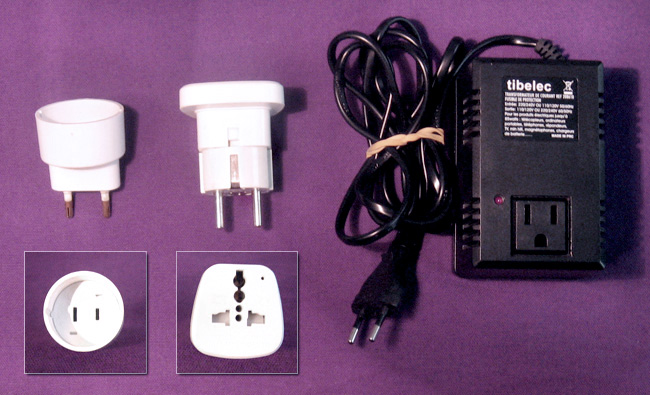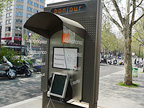Using your American electrical devices in France
Most of your American electronic devices cannot be used in France, with the big exception of laptop computers, smartphones (i.e. iPhone, etc), and tablets (i.e. iPad) (more on that below). So, no hairdryers! Here's a little explanation of why this is the case, as well as some solutions...
Different countries, different voltage

Electricity is different in France than it is in the US! You probably already knew this. The difference isn't just the shape of the outlets, it's also a matter of voltage (i.e. power). Without getting overly scientifical here, the electricity coming out of your wall in the States is 110 volts, whereas in France it's 230-240 volts, i.e. more than twice as powerful as back home. So that means one important thing: most of your electronic stuff from the States can't be used in France. Even with an adaptor to change the shape of the plug!
You can buy US-Europe adaptors at most electronics stores in the US or in Europe, which might lead you to believe you can just plug in whatever you want in France, but that's not the case; the higher voltage will ruin a lot of your American electronic devices. So I'm afraid you won't be able to use your American hairdryer, flat iron, curling iron, electric razor, certain camera chargers, etc. So save the room in your luggage; if you bring any of that stuff and plug it in in France, at best you risk breaking it, and at worse you risk getting shocked, or worse!
Anyway, there are a few notable exceptions to the rule that American electronic stuff can't be used in France...
Computers
You can definitely use your laptop computer in France. This is because the power cable for your computer has that heavy black box thing in the middle, which is the power adaptor. This device takes the electricity coming out of the wall and automatically regulates how much of it gets into your computer. You can even look at the fine print on the label on the adaptor and see something like "Input: 110-240V." The numbers might vary a bit, but you'll see that this range covers the voltage in both the US and in France. So, you can buy yourself a simple wall adaptor — which can range from about three to twelve euros, depending on whether your computer cable has two or three prongs — and plug in your computer in France with no problem.
iPhone/iPad
iPads and iPhones are fine. Both the little cube shaped plug thing that come with iPhones, and the bigger adaptor with the flip-out plug that comes with iPads, are all good. You can find the fine print on both of them that says 110-240V. So all you need is a regular wall adaptor and you're all set.
I don't have an Android but of course they're fine as well; check out the fine print on the label.
Other stuff
For any other other electronic device that looks like it has an adaptor as part of its cable, you can always look for a label and confirm that the voltage input covers that same wide range of 110-240V, as described above. Same digital camera chargers have it, for example, but some do not. When it doubt, don't plug it in! If it's something really important and you're not sure, you can always ask for advice at a large department store, and if necessary, buy a voltage converter (not to be confused with a simple wall adaptor; see Voltage Converters, below).
Wall adaptors
Like I mentioned, the simple wall adaptor that will let you plug in your American computer in France is relatively cheap; often just a few dollars/euros, and can be found at just about any electronics store in the US or France. An easy place to pick one up is BHV, a big department store in the center of Paris. There's a large electronics department in the basement level of the store, and they always have a huge bin of adaptors for all the combinations of different countries' power sources. You can also find adaptors at other large electronics stores like Fnac, Darty, etc.
Interestingly, for computer cables with two prongs, you can get a simple and inexpensive adaptor for about three to four euros (pictured on the left in the photo above), but if your computer cable has three prongs, you'll need to buy a different adaptor that costs around ten to twelve euros (pictured in the center of the photo). This one is more expensive because it's a multi-country adaptor, with irregularly-shaped holes to accommodate plugs of several different sizes. Unfortunately, I've never been able to find a simple, three-prong, two-country (US to Europe) adaptor. So this more-expensive, multi-country adaptor is your best bet if you've got three prongs.
Voltage converters
While a cheap power adaptor that simply changes the shape of the plug will work for your computer/phone/tablet in France, it's also possible to buy a larger device called a voltage converter (pictured at the right side of the photo above) that will let you use any and all of your American electronic devices in France. These are a lot more expensive — while a simple adaptor costs three to twelve euros, a voltage convertor is usually closer to 45 euros or more. The voltage converter comes with attachments for the plug shapes of both the US and France (and other countries as well), and there's a switch to indicate which type of voltage you're plugging into and which type of device you're plugging in. This converter is a good solution for any instances where you absolutely have to plug in an American device in France. I bought one of these at BHV a couple years ago in order to plug in a fancy designer lamp I'd bought in the States. Now, keep in mind, it would be a waste to buy one of these things just to bring your American hairdryer; you can get a French hairdryer in Paris for much less than the cost of a voltage converter. Of course you won't be able to bring it home and use it, but c'est la vie.
Batteries
Fortunately, regular ol' batteries (like AA, C, D, etc.) are universal. So when you need batteries for your digital camera or whatever, you can simply buy the appropriate size from any electronics store, supermarket, or souvenir shop (where they're going to be insanely overpriced), and that'll do the trick.
Good luck, and for pete's sake, be careful!


 BHV — a huge department store with everything
BHV — a huge department store with everything
 Making phonecalls to and from France
Making phonecalls to and from France